When it comes to the stakes involved in today’s Iraq “withdrawal,” so far discussion has focused on the implications for the U.S. project in Iraq. But the outcome, as reflected in the security situation over the next six months, will have regional repercussions as well, because we’re currently applying variations of the same nation-building model we’ve used in Iraq around the Middle East and South Asia. The most obvious example is Afghanistan, and there’s overlap with what we’re pressuring Pakistan to do in the FATA. But there’s also the U.S. involvement in training Palestinian security forces in the West Bank. […]
South Asia Archive
Free Newsletter
Looks like I wasn’t the only one to scratch my head about the eagerness to condemn what transpired in Honduras as an anti-democratic, extral-legal military coup. Jason Steck, writing at RCW’s The Compass, tries to clear things up: What both sides miss is that a “coup” isn’t always extralegal. In short, what is happening in Honduras may be an example of a coup that is not only legal, but mandatory. The oddness of this concept to American minds requires an explanation. [. . .] . . . [S]ome countries explicitly endow their military with a role inmaintaining democratic governance. . […]

With Thailand posting a 17-year record drop in exports for the first quarter of 2009, and the economy shrinking by 7.1 percent as a consequence, the global downturn is clearly causing severe problems for some one-time stellar performers. Like its Tiger Economy counterparts, Malaysia and Singapore, Thailand’s exports account for a majority of the country’s economic activity — more than 60 percent in Thailand’s case. Ultimately, these countries depend heavily on Western consumers buying the products they make, or the ones they make components for, depending on the particular industry and local position in the globalized manufacturing chain. Given their […]
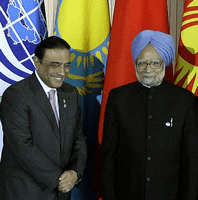
ISLAMABAD, Pakistan — The leaders of Pakistan and Indian recently agreed to restart the stalled “peace” process between the two countries. Known as the “Composite Dialogue,” the talks were suspended after the Mumbai terrorist attacks in November 2008, which India blamed on Pakistan-based militant outfits, primarily Lashkar-e-Tayyaba (LeT). India, however, has limited the focus of any future talks between foreign secretaries to the issue of cross-border terrorism, thereby limiting optimism about their chances of success as well. Indian Prime Minister Manmohan Singh and Pakistani President Asif Ali Zardari agreed to resume the Composite Dialogue during a meeting on the sidelines […]
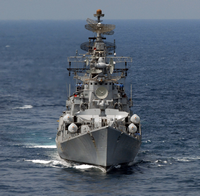
NEW DELHI — Most of the attention given to India’s big defense modernization program, valued at more than $50 billion, has focused on the $11-billion fighter jet contract that New Delhi is looking to sign. However, concerned by the threat from the seas, especially in the wake of the Mumbai terror attacks in November, India has been looking to build its naval strength as well. In a recent move, the federal government has also designated the Indian navy as the nodal authority responsible for overall maritime security, which includes coastal and offshore security. Last week, India approved its biggest-ever domestic […]
If you read only one article about the Afghanistan war each week, make it this Washington Post article. If you read dozens of articles about the Afghanistan War each week, make sure to add it to the list. It is a very, very eye-opening piece of reporting that illustrates to what degree our failure in that theater has to do as much with shockingly poor conception, management and execution as it does with the difficulty of the task. It also shows to what degree foreign policy failures are determined, often years prior, by domestic policy failures. Just like it often […]
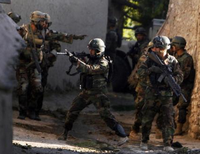
Winning American wars these days is four parts politics and just one part fighting. Contemporary military doctrine — counterinsurgency and stability operations — tasks soldiers, on the whole, with state-building. Victory, or at least success, means building from the bottom up, rather than destroying from the top down. But because conditions on the ground are so delicate, for the one part of warfare that remains fighting, there’s no room for error. With Gen. Stanley McChrystal taking charge of U.S. and NATO troops in Afghanistan on Monday, warfighting is on everyone’s minds. McChrystal has been appointed to command the Afghanistan war […]
Claude Rakisits, writing in the Australian, describes the aftermath of the Pakistani campaign to oust the Taliban from Swat: Few people seem to realise that the Pakistan army’s militaryoperation to dislodge the Pakistani Taliban militants from the SwatValley has caused about 2.5 million people to flee and seek refugeelsewhere. This vast and sudden movement of people is the world’sbiggest since the 1994 Rwandan genocide. About 80 percent of theseinternally displaced people have been accommodated with friends,families and even total strangers because the government of Pakistanwas utterly unprepared for this humanitarian disaster. The good news is that the Pakistan army has […]
This NY Times report on the makings of a “thaw” in Pakistan-India relations is certainly the storyline Washington is hoping for. The problem is that India feels like Pakistan isn’t doing enough to fight terrorism, Pakistan feels that no one is doing more to fight terrorism, and both sides are to a large degree right. President Barack Obama’s initial hopes to play the peacemaker between the two was a non-starter with India. And as Siddarth Srivastava points out in his WPR Briefing, the subsequent pivot to bring Pakistan more explicitly on board with the U.S. counterterrorism approach is increasingly perceived […]
In his WPR feature article (sub. req.) on the Tamil insurgency in Sri Lanka, Brian Calvert discussed how LTTE’s chances for surviving the military eradication it suffered on the island depended on the Tamil diaspora: The Tigers were such a formidable guerrilla army because of theirglobal operations, and LTTE’s international network remains in place.What happens next will be determined by how well the international armis able to recover from the loss of its leader, and how well it managesto maintain its vast fundraising capacity. . . . The Tigers were a highly centralized network centered aroundPrabhakaran and senior leaders in […]
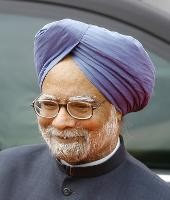
NEW DELHI — U.S.-India relations have experienced a period of strain under the presidency of Barack Obama, with India increasingly unhappy about how the new administration is shaping its policy in the South Asian region. It is not just one or two matters that have raised concerns for New Delhi, but rather the gathering impression over the last few months that some of the closeness in relations enjoyed under the Bush administration, exemplified by the U.S.-India civilian nuclear deal, is dissipating under Obama. Some observers say that under Bush, Washington was more concerned about propping up India as a counterweight […]
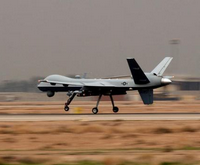
The skyrocketing use of unmanned aerial vehicles (UAVs) by U.S. forces in Iraq and Afghanistan has generated intense debate about how useful they are against insurgent/terrorist networks. Some prominent counterinsurgency experts have decried the “siege mentality” among non-combatant locals caused by collateral damage from the drone strikes. But despite the charge that drones represent a technology (i.e., a means) in search of a strategy (i.e., end goals), there’s no question that: 1) drones are here to stay, and 2) they’re truly re-symmetricizing the battlefield in a much-needed manner. Over the past generation, warfare has dramatically downshifted, from the Cold War’s […]
The circumstances surrounding Iran’s presidential election, and in particular the declaration of Iranian President Mahmoud Ahmadinejad as the winner despite opposition accusations of vote rigging, will present difficulties for any attempt by the Obama administration to diplomatically engage the Islamic Republic of Iran. The administration had been circumspect during Iran’s election campaign, but clearly it was hoping for a reformist victory by either Mir Hossein Moussavi or Mehdi Karrubi. Although neither would have guaranteed a thaw in U.S.-Iranian relations, a reformist victory would have made engaging Iran an easier political sell, both in Washington as well as among European and […]
I don’t want to make too much of this NY Times story about al-Qaida operatives making their way from Pakistan to Yemen and Somalia. It’s based on a pretty small sample size, as well as on a “senior Obama administration official” who has every reason to attribute “some of the movement to ‘the enormous heat we’ve been putting on the leadership and themid-ranks’ with Predator strikes, launched from both Pakistan andAfghanistan.” After all, widening the drone strikes in Pakistan was one of President Barack Obama’s campaign stances, so it’s no surprise to see his administration pushing back against the growing […]
For some reason, this sentence from the CNAS report (.pdf) on Afghanistan and Pakistan that I wrote up yesterday kept rattling around the cranium: But because populations in civil wars tend to side with whichever group exercises control, protecting the population must take precedence over all other considerations. That sums up in a nutshell the central premise of COIN doctrine, from which all of its operational priorities are derived. Now, to be very clear, unlike Michael Cohen, I think that the COIN doctrine represents an enormous advance in the U.S. approach to warfare, both strategically and politically. Strategically, it represents […]
After flagging this very valuable post by Tim Lynch on conditions inthe southeast of Afghanistan, Joshua Foust observes, “[T]here is afundamental disconnect between what we are doing in Afghanistan andwhat we expect to happen.” Lynch’s post is a long but essential read,and I second Foust’s assessment. The question is, Will the added troopsand vaguely hinted-at shift in operational priorities be sufficient torecouple what we’re doing with what we expect to happen? With that question fresh in my mind, I clicked through tothe new CNAS report (.pdf) on Afghanistan and Pakistan, which offers proposalsfor metrics and operational priorities on both sides […]
For those of you who enter the site through the blog, I’d like to encourage you to take a look at our new feature issue, which just went live today. In it, we take a close look at three intractable conflicts that have resisted solutions for generations, and that we’ve all seen drifting in and out of the headlines for decades now: Sumantro Bose examines the Kashmir conflict, Brian Calvert looks at Sri Lanka, and Gareth Jenkins shines a light on Cyprus. (All three sub. req.) What I found most fascinating, in going through them all, is that while the […]
